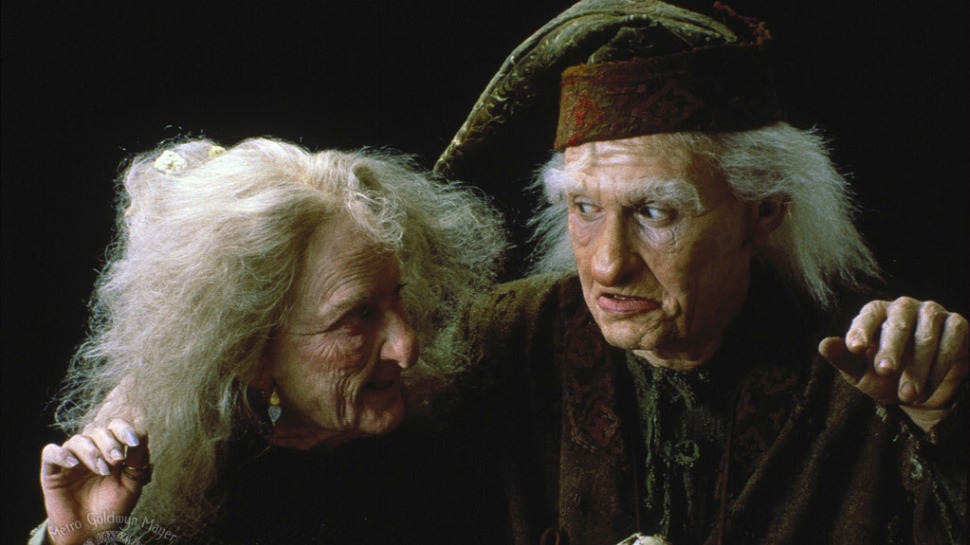If and when someone were to begin a conversation with you about the plentiful number of characters in high-fantasy fiction stories who fall into the generalized category of wise, old members of society who have magical tricks up their sleeve, which, for the record, happens to me all the time, characters who spring to mind are Gandalf. Dumbledore. The professor from The Lion, the Witch, and the Wardrobe. Mentors that provide wisdom to the main characters and help bail them out of hard situations, when need be. In high-fantasy type stories, we see repeated, classic personifications of the mentor archetype. So where does this character appear in a wonderfully otherworldly story such as The Princess Bride? Though he looks almost nothing like any of the mentors mentioned above, I’m here to tell you: that man is Miracle Max.
The first of many unconventional aspects of Miracle Max that sticks out to me is the timing of his entrance into the plot of The Princess Bride. Usually the magical mentor figure appears close to the beginning of the story, there to help the hero navigate their adventure from the beginning. Sometimes the hero will know their mentor before they embark on their adventure, like with Gandalf and Frodo. Other times, the mentors are allies that the heroes find after they’ve already begun their journey, like with Harry and Dumbledore. Either way, the mentor serves as a navigator for the hero, helping them orient themselves on their path. Miracle Max is a massive exception to these standard cases. Until the story is just about three quarters over, we don’t even know that Miracle Max exists. Even when he enters the scene, he doesn’t do much mentoring for anyone involved, either. He’s sort of just there to offer his magical abilities and cures.
He doesn’t offer these things freely, however: Max is obstinate that he won’t help Inigo and Fezzik revive Westley. He tries to tell us that this is because his self esteemed is ruined due to Prince Humperdinck firing him. In reality, Max is still throwing himself a massive pity party because he was fired from his work at the palace, and is essentially pouting and refusing to do anything because he’s too busy pouting. Enter another often-unseen variation on the wise mentor: Max’s wife, Valerie. She has been listening in on the dialogue between Max and Inigo and Fezzik the whole time, and is outraged at the pity party her husband is insistent on having. She’s heard that Westley deserves to life for his true love, and is getting on her husband for not helping them.
This is when it hits Inigo: Max is full of plenty of selfish motives against Prince Humperdinck, which is not common for mentors. Usually the wise, old person in the mentor role has only the greater good in mind, and has faith in the hero or heroes that they can do what’s right, if only with a little help. Not so with Miracle Max. Max is bitter, having been fired by Humperdinck himself. It’s only when Inigo figures out that this is the only thing that will motivate Max that he can talk Max into reviving Westley. The only thing that would turn his head was that if Westley lived, he would take down Prince Humperdinck, as the prince was holding Buttercup captive. Miracle Max nearly exploded with glee at this point, and he became suddenly all too eager to help Westley.
There is one last huge part of Max that sets him apart from his peers such as Gandalf and Dumbledore. Max doubles as comedy relief. Granted, the vast majority of The Princess Bride is some form of comedy relief, but this is highly unusual to see in a character that upholds the mentor archetype. The whiny tone to everything he says, his banter with Valerie, and even the comical quality to the cure he has for being almost-dead makes us laugh with and at Max. This is a deviation from the typical sage guide that is the hallmark of a mentor, and everyone loves and remembers Max for it.
The unique humor of Miracle Max, and, really, the whole of The Princess Bride is going to be the focus of the last post of the month, coming this Monday as we close out not only our study of the conventional and unconventional aspects of the story of the month, but the study of The Princess Bride as a whole. Join us again on Monday as we dissect this beloved tale in a new light and I announce the topic of conversation for next month!

